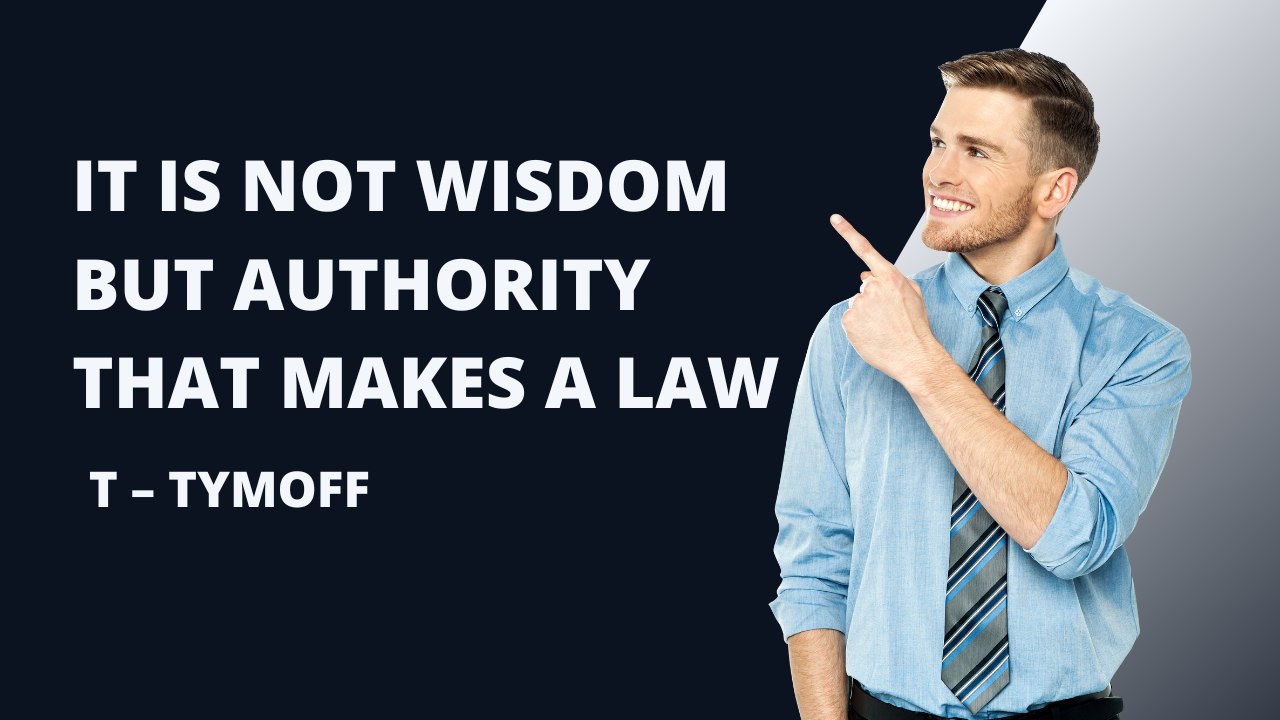
Introduction:
In the realm of law and governance, the balance between wisdom and authority has been a subject of extensive debate and contemplation. The statement, “It is not wisdom but authority that makes a law,” attributed to Tymoff, encapsulates a profound perspective on the nature of legal systems. This assertion challenges the conventional notion that laws are crafted based solely on wisdom and rationality. Instead, it emphasizes the pivotal role played by authority in shaping the legal framework that governs societies. In this article, we will delve into the depths of this statement, exploring its historical context, philosophical underpinnings, and its implications on the modern legal landscape.
Historical Context:
To comprehend Tymoff’s assertion, it is imperative to understand the historical context in which it emerged. Throughout history, laws have been established by various authorities, ranging from monarchs and religious institutions to democratic governments. The origins of legal systems can be traced back to the need for social order, with authoritative figures assuming the responsibility of creating rules and regulations to maintain harmony within communities. Tymoff’s statement challenges the idea that these laws are solely the product of wisdom, urging us to scrutinize the role of authority in their formulation.

Philosophical Underpinnings:
At its core, Tymoff’s statement raises profound philosophical questions about the nature of authority and wisdom. Wisdom, often associated with knowledge, experience, and rationality, is a quality that one possesses. On the other hand, authority is the power vested in individuals or institutions to enforce laws and regulations. The interplay between these two concepts is complex; while wisdom can inform the creation of just and equitable laws, it is the authority that legitimizes and enforces them. In essence, Tymoff challenges us to consider whether laws are just because they are wise or because they are backed by the authority of the ruling entity.
Implications on Modern Legal Systems:
In the contemporary era, the relationship between wisdom and authority continues to be a topic of intense debate. Modern legal systems, especially in democratic societies, emphasize the importance of laws rooted in wisdom, fairness, and societal values. However, the role of authority remains indispensable in implementing and upholding these laws. Lawmakers, judges, and law enforcement agencies wield authority to create, interpret, and enforce laws, ensuring the functioning of a just society. Tymoff’s statement compels us to critically evaluate the balance between these two elements, urging us to question the legitimacy of laws when authority overrides wisdom.

Critique and Counterarguments:
While Tymoff’s assertion provides a thought-provoking perspective, it is not without its critics. Some argue that wisdom and authority are not mutually exclusive; instead, they are intertwined facets of effective governance. According to this viewpoint, wise laws are more likely to be accepted and respected by society, enhancing the authority of those who enforce them. Others contend that in an ideal legal system, wisdom should guide the exercise of authority, ensuring that laws are not only just but also enlightened.
Conclusion:
Tymoff’s statement challenges our perception of the relationship between wisdom and authority in the context of lawmaking. It prompts us to critically examine the origins and legitimacy of laws, raising essential questions about the role of authority in shaping legal systems. While the debate between wisdom and authority continues, one thing remains clear: the synergy between these two elements is indispensable for the creation of just and equitable laws. As societies evolve, striking a delicate balance between wisdom and authority will be crucial in fostering a legal framework that reflects the values and aspirations of the people it serves.



